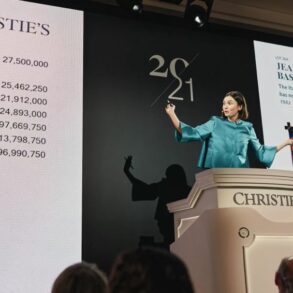
After 14 years of Conservative rule, the U.K. has elected the Labour Party to public office. The party comes into power after achieving a landslide victory in the U.K.’s general election earlier this month, winning 411 of a possible 650 seats in Parliament. The result gives Prime Minister Keir Starmer a commanding majority, allowing him to pass new legislation with ease.
The Labour Party campaigned on the back of a simple slogan: “Change.” As the government settles into power, what might this mean for the U.K.’s art industry? Here, we review Labour’s policy stances to identify three ways where these changes could impact the art market.
1. A potential blow to wealth?
The U.K. art market is the third largest in the world and much of its heft comes from the country’s sizable population of affluent collectors and patrons. According to data from the Global Wealth Report, the country has the fourth largest population of millionaires in the world.
Labour’s plans for taxation, however, are raising fears that the wealthy will be placed in its crosshairs. It’s becoming increasingly clear that the party will look to fill what it is expected to claim is a £20 billion ($25.7 billion) gap in public finances by taxing wealthy individuals through measures that could include rises to capital gains and inheritance levies.
Last year, the Labour Party also pledged to end the non-domicile tax regime, which had previously enabled wealthy U.K. residents to avoid paying tax on their international income. The Labour position was adopted by the then-Conservative government in March and has already led to reports of wealthy individuals relocating. Some 9,500 millionaires are expected to leave the U.K. this year, according to the advisory firm Henley & Partners.
Whether this will impact the U.K.’s art market remains to be seen, but concerns have been raised that there could be repercussions for the country’s luxury sector, of which art is a significant part.
2. Public arts under review
Labour has signaled its intent to grow the U.K.’s arts and culture industry, which it says contributes £125 billion ($161 billion) to the national economy. But recent years have seen funding gaps emerge in the network of cultural institutions and art schools, which have long supported and grown the U.K.’s artistic talent.
According to a report released last week by the Campaign for the Arts and the University of Warwick, the U.K. has “one of the lowest levels of government spending on culture among European nations.” Its total culture budget has been cut by 6% since 2010.
There are tentative signs that Labour will look to address some of these issues—even if it hasn’t yet announced any concrete funding. A document published by the party in March titled “Creating Growth” strongly emphasized supporting and broadening access to the arts. Labour said that it would launch a review of the Arts Council England, a public body chaired by former Tate director Sir Nicholas Serota that invests directly in the arts, to “steward arts and culture through the 21st century.”
The document also said that the party would work with entities including private donors and investors to create a private funding model that would “attract more funding from different sources into arts organizations.” And it noted the importance of small businesses—a category many galleries undoubtedly belong in—to the U.K.’s creative industries. The party said that it would replace business rates (taxes on non-domestic properties) with a “fairer” system.
3. A softening of Brexit burdens?
The British art market has been hamstrung by a combination of legislative, bureaucratic, and economic factors that have persisted since the U.K. voted to leave the EU in 2016. Logistical costs such as shipping have as much as quadrupled, while smaller galleries have been overburdened with extra paperwork.
There are tentative signs that these burdens could begin to cease. The British Art Market Federation, which represents the interests of the U.K.’s art and antiques market, confirmed to Artsy that it had spoken to Labour officials about these issues when the party was in opposition and is expecting to discuss them further now that the party is in government.
There are indications that some of these burdens will be addressed. The Conservative government launched a consultation earlier this year that looked at waiving value-added tax (VAT) on some imported artworks. And in a recent speech, Starmer trumpeted the fact that the U.K. has the “second largest art market on the planet” (it has since slipped to third place). Watch this space.




